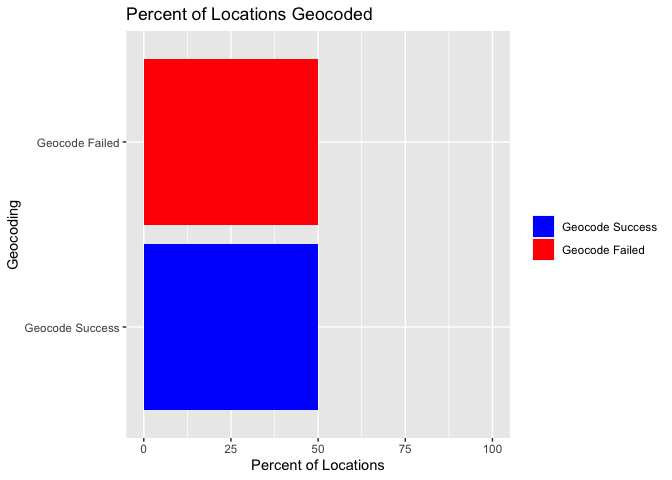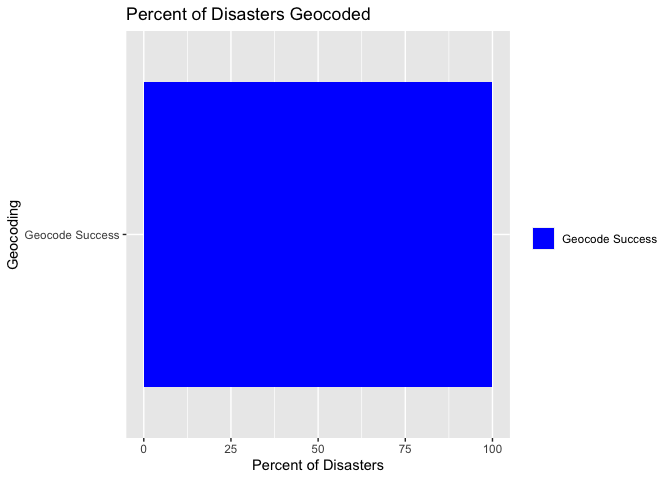
The goal of weed is to make the analysis of EM-DAT and related datasets easier, with most of the pre-processing abstracted away by functions in this package!
Installation of the following packages : readxl, dplyr, magrittr, tidytext, stringr, tibble, geonames, countrycode, purrr, tidyr, forcats, ggplot2, sf, rgeos.
You also need a geonames user account if you intend to use the geocoding functionality of this package. Info on how to get one for free is available here.
You can install the development version from GitHub with:
This is a basic example which shows a common weed workflow:
em <- read_emdat("/Users/ramkripa/Desktop/Tk2.xlsx", file_data = TRUE)
#> New names:
#> * `` -> ...1
#> * `` -> ...2locationized_data <- em$disaster_data %>%
tail() %>%
split_locations(column_name = "Location") %>%
head()
locationized_data %>%
select(`Dis No`, Location,location_word, Latitude, Longitude, uncertain_location_specificity)
#> # A tibble: 6 x 6
#> `Dis No` Location location_word Latitude Longitude uncertain_locati…
#> <chr> <chr> <chr> <chr> <chr> <lgl>
#> 1 2019-051… Handeni district… handeni <NA> <NA> TRUE
#> 2 2019-051… Handeni district… tanga <NA> <NA> TRUE
#> 3 2019-056… Mwanza district mwanza <NA> <NA> FALSE
#> 4 2020-016… West Pokot, Elge… west pokot 116.343 365.935 FALSE
#> 5 2020-016… West Pokot, Elge… elgeyo marak… 116.343 365.935 FALSE
#> 6 2020-016… West Pokot, Elge… kisumu 116.343 365.935 FALSEThere are two problems with the Dataset as it exists here.
Half of our observations, even in this toy dataset, don’t have Lat/Long data
The Lat/Long here is blatantly wrong.
Lat > 90? Long > 360? How is this possible?
So, we must recode this Lat/Long data

A reminder that you need a geonames username to access this feature of the weed package.
More info available here.
geocoded_data <- locationized_data %>%
geocode(geonames_username = dummy_name)
geocoded_data %>%
select(`Dis No`, Location,location_word, lat, lng)
#> # A tibble: 6 x 5
#> `Dis No` Location location_word lat lng
#> <chr> <chr> <chr> <dbl> <dbl>
#> 1 2019-0515-… Handeni district (Tanga Region) handeni -5.55 38.3
#> 2 2019-0515-… Handeni district (Tanga Region) tanga -5.07 39.1
#> 3 2019-0562-… Mwanza district mwanza -2.52 32.9
#> 4 2020-0164-… West Pokot, Elgeyo Marakwet, Kisumu, H… west pokot 1.75 35.2
#> 5 2020-0164-… West Pokot, Elgeyo Marakwet, Kisumu, H… elgeyo marak… 0.516 35.5
#> 6 2020-0164-… West Pokot, Elgeyo Marakwet, Kisumu, H… kisumu -0.102 34.8Side note: These Lat/Long data look much better than before, given that Kenya is close to the equator!


geocoded_data <- geocoded_data %>%
located_in_box(top_left_lat = 0,
top_left_lng = 35,
bottom_right_lat = -6,
bottom_right_lng = 40)
geocoded_data %>%
select(`Dis No`, Location,location_word, lat, lng, in_box)
#> # A tibble: 6 x 6
#> `Dis No` Location location_word lat lng in_box
#> <chr> <chr> <chr> <dbl> <dbl> <lgl>
#> 1 2019-0515… Handeni district (Tanga Region) handeni -5.55 38.3 TRUE
#> 2 2019-0515… Handeni district (Tanga Region) tanga -5.07 39.1 TRUE
#> 3 2019-0562… Mwanza district mwanza -2.52 32.9 FALSE
#> 4 2020-0164… West Pokot, Elgeyo Marakwet, Kis… west pokot 1.75 35.2 FALSE
#> 5 2020-0164… West Pokot, Elgeyo Marakwet, Kis… elgeyo marak… 0.516 35.5 FALSE
#> 6 2020-0164… West Pokot, Elgeyo Marakwet, Kis… kisumu -0.102 34.8 FALSEgeocoded_data %>%
located_in_shapefile(shapefile_name = s_file_name) %>%
select(`Dis No`, Location, location_word, lat, lng, in_box, in_shape)
#> Reading layer `SH_mask' from data source `/Users/ramkripa/Desktop/Projects/emdat_proj/shape_data/SH_mask.shp' using driver `ESRI Shapefile'
#> Simple feature collection with 1 feature and 1 field
#> geometry type: MULTIPOLYGON
#> dimension: XY
#> bbox: xmin: -178.9 ymin: -50 xmax: 179.85 ymax: 50
#> geographic CRS: WGS 84
#> Warning: `rename_()` is deprecated as of dplyr 0.7.0.
#> Please use `rename()` instead.
#> This warning is displayed once every 8 hours.
#> Call `lifecycle::last_warnings()` to see where this warning was generated.
#> although coordinates are longitude/latitude, st_contains assumes that they are planar
#> # A tibble: 6 x 7
#> `Dis No` Location location_word lat lng in_box in_shape
#> <chr> <chr> <chr> <dbl> <dbl> <lgl> <lgl>
#> 1 2019-0515… Handeni district (Tanga… handeni -5.55 38.3 TRUE TRUE
#> 2 2019-0515… Handeni district (Tanga… tanga -5.07 39.1 TRUE TRUE
#> 3 2019-0562… Mwanza district mwanza -2.52 32.9 FALSE FALSE
#> 4 2020-0164… West Pokot, Elgeyo Mara… west pokot 1.75 35.2 FALSE TRUE
#> 5 2020-0164… West Pokot, Elgeyo Mara… elgeyo marak… 0.516 35.5 FALSE TRUE
#> 6 2020-0164… West Pokot, Elgeyo Mara… kisumu -0.102 34.8 FALSE TRUEgeocoded_data %>%
nest_locations() %>%
select(`Dis No`, location_data)
#> # A tibble: 6 x 2
#> `Dis No` location_data
#> <chr> <list<tbl_df[,4]>>
#> 1 2019-0515-TZA [2 × 4]
#> 2 2019-0515-TZA [2 × 4]
#> 3 2019-0562-TZA [1 × 4]
#> 4 2020-0164-KEN [3 × 4]
#> 5 2020-0164-KEN [3 × 4]
#> 6 2020-0164-KEN [3 × 4]